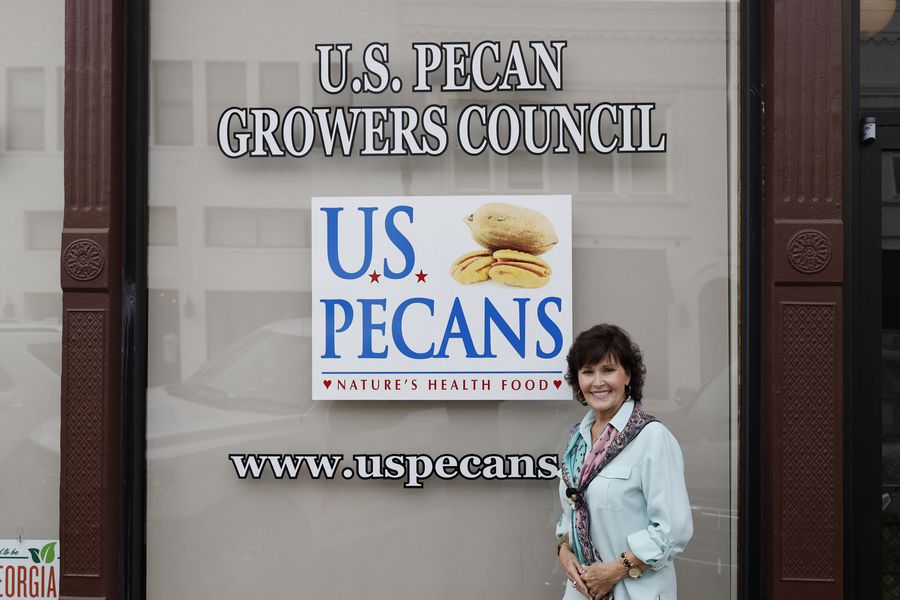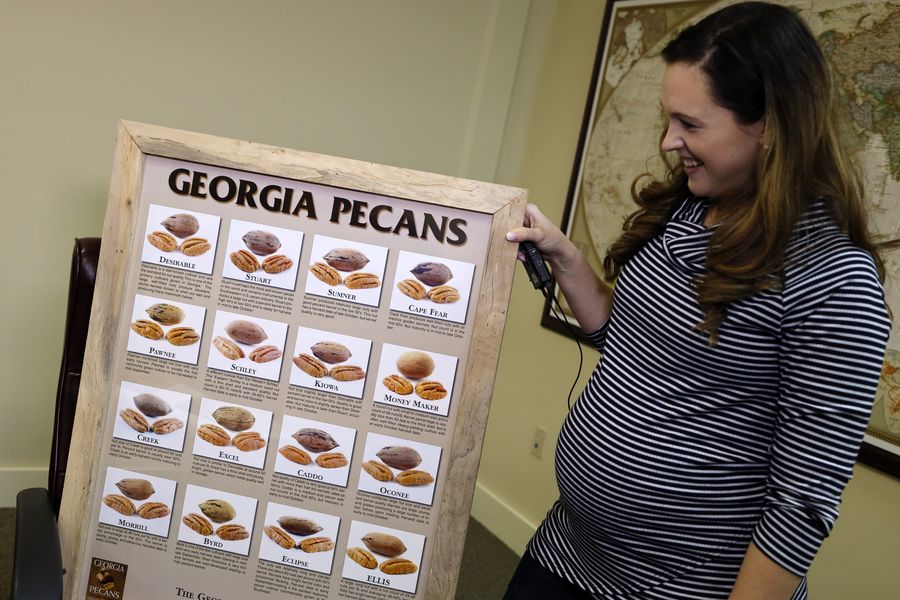
Janice Dees, executive director and international marketing manager of U.S. Pecan Growers Council, poses for a photo outside her office in Tifton, Georgia, the United States, Oct. 25, 2019. (Xinhua/Li Muzi)
China was the top market for U.S. pecans. In 2017, U.S. in-shell pecan exports reached more than 300 million U.S. dollars, and a staggering 76.37 percent were sold to China.
NEW YORK, Dec. 26 (Xinhua) -- The announcement of China-U.S. phase-one trade deal came at a time when U.S. pecan growers were struggling to make ends meet by selling pecans to domestic market at a discounted price.
It was the most exciting piece of news of the year for many of the pecan growers, who suffered substantial losses since the start of the U.S.-initiated trade war against China, the largest market for the U.S. pecan industry.
Randy Hudson, a pecan grower in Irwin County, Georgia, said he and his fellow pecan farmers were "encouraged" by the fact that leaders of the two countries are working on the tariff issue.
The Chinese side announced on Dec. 13 that China and the United States have agreed on the text of a phase-one economic and trade agreement based on the principle of equality and mutual respect.
While waiting for the details of the trade deal, Hudson said "we would have hoped that all tariffs would be removed, at least back to the original level."
China was the top market for U.S. pecans. In 2017, U.S. in-shell pecan exports reached more than 300 million U.S. dollars, and a staggering 76.37 percent were sold to China, according to pecanreport.com.
Hudson is among the earliest pecan growers to enter the Chinese market and has maintained a close business relationship with his partners in China.

Samantha McLeod, executive director with Georgia Pecan Growers Association, displays a poster of Georgia Pecans, during an interview with Xinhua in Tifton, Georgia, the United States, Oct. 24, 2019. (Xinhua/Li Muzi)
Since he brought the nuts to the Chinese market in 1999, Hudson and his fellow pecan growers and exporters, as well as their Chinese partners, have managed to grow the business in China, with an increasing number of consumers interested in the nuts' health benefits and rich flavor.
Prior to the latest trade tensions, Hudson's company exported 10 million to 20 million pounds (about 4,500 to 9,000 tons) of pecans every year, accounting for about 20 to 30 percent of Georgia's total annual output of pecans.
To satisfy Chinese demand, the company bought pecans from other growers. The Chinese market accounted for 90 percent of the company's total sales revenue.
However, increased tariffs had been eroding Hudson's business expansion in China, costing him tens of thousands of dollars in losses and the whole pecan industry more than 10 million dollars.
Irwin County exported nearly 50 million dollars' worth of pecans to China in 2017, but the volume dropped to zero after U.S.-China trade tensions began. In 2018, the county's pecan exports plunged to a record low of less than 10 million dollars.

A woman shops in a store of Ellis Bros. Pecans Inc., in Vienna, Georgia, the United States, Oct. 25, 2019. (Xinhua/Li Muzi)
Pecan prices declined about 40 percent due to oversupply caused by trade tensions, according to Hudson's estimation. This means the local industry suffers more from trade tensions than from damage caused by hurricanes.
The U.S. government provided pecan growers subsidies equal to about 146 dollars an acre to help them recover from losses due to trade tensions. But that was far from enough.
"It's been very, very difficult to be able to balance our income with our expenses under the burden of the tariff," said Hudson.
Like many of his fellow growers and exporters, Hudson still tries to maintain a good relationship with his Chinese clients.
Although business has paused for the moment, both sides exchange information and keep each other updated about their businesses, hoping to resume cooperation soon. Keeping the relationships afloat is key and often personal.
"We are friends first," he said. ■



